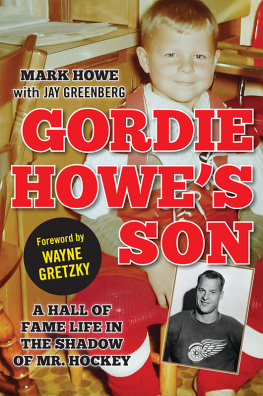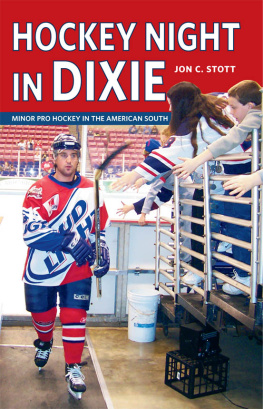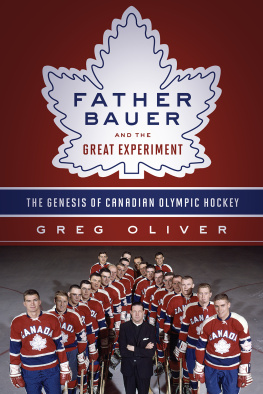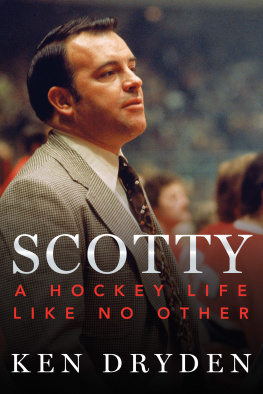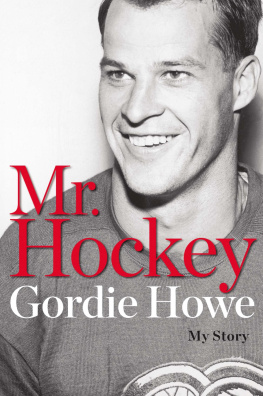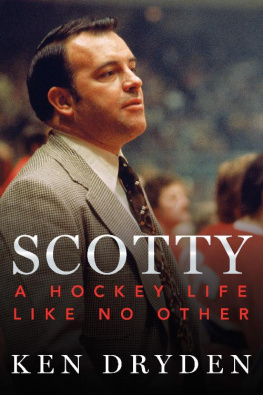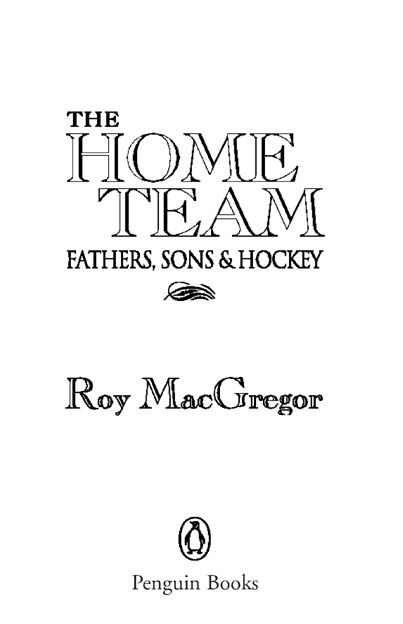P ENGUIN B OOKS
T HE H OME T EAM
Roy MacGregor has been a journalist for more than twenty years. He has worked at most of the major magazines and newspapers in Canada and is currently sports columnist with The Ottawa Citizen (and is syndicated through Southam News). A member of the Parliamentary Press Gallery for fourteen years, MacGregor has won numerous national awards for his newspaper and magazine work, and twice won the ACTRA Award as best Canadian television dramatist. He is author of seven other books, including the Canadian bestsellers Road Game, Home Game (with Ken Dryden) and the classic hockey novel The Last Season.
PENGUIN
an imprint of Penguin Canada
Published by the Penguin Group
Penguin Group (Canada), 320 Front Street West, Suite 1400, Toronto, Ontario M5V 3B6, Canada
Penguin Group (USA) Inc., 375 Hudson Street, New York, New York 10014, U.S.A.
Penguin Books Ltd, 80 Strand, London WC2R 0RL, England
Penguin Ireland, 25 St Stephens Green, Dublin 2, Ireland (a division of Penguin Books Ltd)
Penguin Group (Australia), 707 Collins Street, Melbourne, Victoria 3008, Australia (a division of Pearson Australia Group Pty Ltd)
Penguin Books India Pvt Ltd, 11 Community Centre, Panchsheel Park, New Delhi 110 017, India
Penguin Group (NZ), 67 Apollo Drive, Rosedale, Auckland 0632, New Zealand (a division of Pearson New Zealand Ltd)
Penguin Books (South Africa) (Pty) Ltd, 24 Sturdee Avenue, Rosebank, Johannesburg 2196, South Africa
Penguin Books Ltd, Registered Offices: 80 Strand, London WC2R 0RL, England
First published in a Viking hardcover by Penguin Canada Books Inc. in 1995
Published in 2015 as a digital edition only
Copyright Roy McGregor, 1995
All rights reserved. Without limiting the rights under copyright reserved above, no part of this publication may be reproduced, stored in or introduced into a retrieval system, or transmitted in any form or by any means (electronic, mechanical, photocopying, recording or otherwise), without the prior written permission of both the copyright owner and the above publisher of this book.
ISBN: 978-0-14-319779-9
Visit the Penguin Canada website at www.penguin.ca
v3.1
For Ann MacGregor:
sister, friend
and lifelong expert on fathers and sons
and the true meaning of family.
With great love and admiration.
Contents
Acknowledgments
The author is grateful to the Ottawa Citizen, publisher Russ Mills, editor Jim Travers, managing editor Sharon Burnside and sports editor Tom Casey for continuing support and opportunity. He is also indebted forever to editor Barbara Berson, both for the idea and for the patience shown in waiting to see if her notion would stick. The book could not have been completed without the guidance of Barbara Berson, Meg Masters and Cynthia Good, as well as that of Louise Curtis, Lori Ledingham and Sean Oakey, who carried it into production. Thanks to everyoneplayers, organizers, executives, oldtimers, authors, poets, politicians, parentswho replied to my letters requesting their thoughts on fathers and sons and hockey. Thanks as well to the great Bruce Bennett, the Citizen and Dr Derek Mackesy for photographs, and to my many colleaguesboth on the road and with competing newspapersfor hints and suggestions. Thanks to Garey Ris for reading. Thanks, as always, to Ellen for friendship and advice, to Kerry, for coming along on some of the interviews, and to Gordie and all his teammates, who each winter let me into their hockey lives. Thank you to all the fathers and sons who put up with the questions and the annoying hanging around. And thank you especially to Duncan MacGregor who unwittingly supplied me with a lifetime of research. He died, unfortunately, just before this book was published. But he didnt need a bound copy to know how much he meant to its creation.
Roy MacGregor
Kanata
July 15, 1995
Prologue
H e is probably the only Canadian who has never been asked where he was that fateful September 28, 1972, when, in the final minute of the final game, Team Canada scored the sixth and winning goal of the greatest hockey series in history. It would be presumed, of course, that Paul Henderson was in heaven at that momentand in a way he wasand that everything that ever needed to be known about how he felt at the 19:26 mark of the third period was written on his face as he leapt, with both arms and stick raised, into the arms of team-mate Yvan Cournoyer. He had to be as ecstatic as the entire country when Foster Hewitts voice began rising towards hockeys most historical touchstone: Heres another shot! Right in front! They score! Henderson has scored for Canada! Henderson right in front of the net and the fans and the team are going wild! Henderson right in front of the Soviet goal with thirty-four seconds left in the game! Canadians would be certain that it would have to be the happiest moment of his life. But they would be wrong.
When I scored that goal in Moscow, Henderson remembered in the spring of 1994, when the puck went over, before there was elation there was a touch of melancholy. I actually thought of my dad. He had died in 68. I remember thinking, Geez, if anybody wouldve loved to see that goal, it would have been him.
It may surprise someand more surprises are coming concerning Paul Henderson and his fatherthat this countrys sports icon would have such thoughts at this moment of triumph. Those who play the great Canadian game of Where Were You When Paul Henderson Scored? were rarely with their fathers. The game was televised in the afternoon in Canada, so viewers were either in school, at work, in a bar or at home. Families together would have been the exception rather than the rule. Fans did not think immediately of their fathers. Most successful hockey players, however, would understand perfectly. Had they themselves been lucky enough to score the greatest goal in history, their first thoughts might well have been the sameno matter what their personal experience with this relationship that looms so large over hockey.
Sometimes it takes an outsider to notice the unusual in what might seem common to others. When Barbara Berson, the editor of this book, moved from New York to Toronto, she was struck by two very Canadian traits: one, the overwhelming passion for hockey, and two, the number of times during television interviews that players would talk about their fathers and the role they had played in their development as players. There was no sense that mothers were excludedquite the contrarybut there was also no denying that the relationship between players and their fathers, who were often their coaches, drivers, patrons and friends as well, was somehow different, somehow more powerful than any father-son sports relationship Berson had noticed while growing up and working in the United States.
In the fall of 1993 she approached me with her idea for a book. Being a Canadian, and being the son of a father who once played senior hockey, as well as the father of a son playing minor hockey, it struck me as far too obvious an observation to merit extra study. Why not a book on how big Canada is? Or cold? Her letter, however, slowly began to haunt me. National pastime, she had written, rites of passage, family traditionshockey is absolutely central and integral to the lives of boys and their dads, and much of what happens between them begins to unfold the very first time a young father leads his little one out onto the ice. Hockey is the vehicle through that complex relationship, and it is also the expression of that relationship. It is backgroundagainst which the evolving father-son dynamic is delineatedand foreground, the stuff of that dynamic. It is form and content, both.


